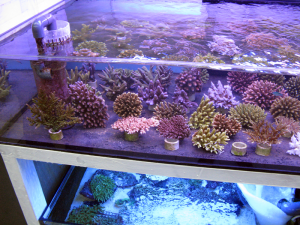 I entered the marine aquarium hobby a long time ago. So long in fact, thinking back about it makes me feel old. Not that I am old, it just seems like a really long time ago. I was a kid when I got into marine aquariums, and I moved into the realm of marine tanks after keeping freshwater aquariums for most of my life. When I was very young, I biked through a snow storm to save a betta fish. The fish had a fungal infection during a blizzard, which had closed our driveway with a drift of snow. The only way I could imagine getting to the pet store was with my Trek mountain bike, and needless to say, I pulled it off. My parents were scared to death; my mom had called the police and my Dad left work to come looking for me. My point is; you can’t doubt my commitment to keeping aquatic life healthy.
I entered the marine aquarium hobby a long time ago. So long in fact, thinking back about it makes me feel old. Not that I am old, it just seems like a really long time ago. I was a kid when I got into marine aquariums, and I moved into the realm of marine tanks after keeping freshwater aquariums for most of my life. When I was very young, I biked through a snow storm to save a betta fish. The fish had a fungal infection during a blizzard, which had closed our driveway with a drift of snow. The only way I could imagine getting to the pet store was with my Trek mountain bike, and needless to say, I pulled it off. My parents were scared to death; my mom had called the police and my Dad left work to come looking for me. My point is; you can’t doubt my commitment to keeping aquatic life healthy.
Years ago finding coral was rare. A handful of people kept marine aquariums, but they were primarily fish only tanks. A few select folks kept reefs, but from my home in rural Maryland, they seemed worlds away. When coral propagation started, it was vital to the hobby to share corals. It wasn’t uncommon to walk into a fish shop, swap a few frags with the owner and get a few new coral colonies for free. This little stroll down memory lane brings me to the topic of this post, learning how to bring reef keeping into the future, by reflecting on lessons from the past.
Stage 1: Access to accurate information:
Sharing information today is on overload. Forums are crammed with aquarists, all throwing their two cents together about how to properly keep marine animals. You can have TOO much information, if the information you have isn’t accurate. Simply type in treating marine ich, and you get a conflicting group of posts all pointing in different directions. Which one is right? Which one is wrong? How could a wary marine aquarist ever tell? Before the internet exploded knowledge about marine aquariums was hard to come by, but when you found it, often it was based off real world experience or research by marine scientists. Bob Fenner pioneered accurate information online with Wet Web Media, and still today puts aquarists in touch with the experts.
 My point is; we need to tighten the reigns a little bit. One of the greatest threats to the hobbies’ future is misinformation. Misinformation leads to failure as an aquarist, which leads to livestock loss, which leads to replacing livestock that should have survived, which leads to environmental decline – a sure fire straight path to tighter regulations on the hobby.
My point is; we need to tighten the reigns a little bit. One of the greatest threats to the hobbies’ future is misinformation. Misinformation leads to failure as an aquarist, which leads to livestock loss, which leads to replacing livestock that should have survived, which leads to environmental decline – a sure fire straight path to tighter regulations on the hobby.
Expert aquarists are out there, many of them right here on this website. I know personally, it’s rare that I venture onto an online forum. When I have in the past, I offer advice based on real experience or research into scientific papers, some of it based on my time working with a public aquarium. Quickly it’s torn apart by a group of aquarists who think they know better, and are throwing around the same misguided wisdom that got the original poster in trouble in the first place. It’s a never ending cycle of disinformation, leading many to drain their tanks, give up the hobby and leave behind a freezer full of dead livestock.
Stage 2: Honesty among aquarists:
As a very select and small marine life vendor, this really hits home for me. In order to provide advice on how to successfully keep marine animals, I need to know what the aquarist is really dealing with. Before I sell marine life to anyone, I like to know a bit about their systems, and their goals. Often I hear tales of 200 or 300 gallon tanks, with advanced filtration and perfect water quality. I quarantine any marine life I sell, and only ship it when I am 100% confident it’s in perfect health. In events that I’ve gotten a refund request due to a specimen’s death, I often find out the 200 gallon was really a 55 gallon, or the tank that was lightly stocked is actually chalk full of totally incompatible species. “Oh I forgot to mention I had a grouper when I ordered that clownfish pair.”
 Aquarists need to be brutally honest with themselves, while understanding the limitations and possibilities within their systems. They then need to be brutally honest with everyone else, including fellow forum members, aquarium advice experts and livestock vendors. I understand that there are tens of thousands of eye catching fish, coral and invertebrate species and keeping them is a shared goal among many aquarists. In reality, each individual species of marine animal needs unique conditions to thrive in captivity. Fish don’t grow to the size of their aquarium, and many commonly offered angelfish, surgeonfish and others, require very large aquariums to keep into adulthood. Misleading yourself (or a fellow hobbyist) into believing their system is suited to keep an animal that it is not, does a great dis-service to the hobby, wild reefs and our future as aquarists. Any size aquarium, from a 5 gallon pico reef, on up to a 1,000 gallon super-system can be a beautiful showcase of technology and nature. Tossing animals into systems they will outgrow, or fail to thrive in, leads us back to stage one and creates an endless cycle of replacing marine livestock.
Aquarists need to be brutally honest with themselves, while understanding the limitations and possibilities within their systems. They then need to be brutally honest with everyone else, including fellow forum members, aquarium advice experts and livestock vendors. I understand that there are tens of thousands of eye catching fish, coral and invertebrate species and keeping them is a shared goal among many aquarists. In reality, each individual species of marine animal needs unique conditions to thrive in captivity. Fish don’t grow to the size of their aquarium, and many commonly offered angelfish, surgeonfish and others, require very large aquariums to keep into adulthood. Misleading yourself (or a fellow hobbyist) into believing their system is suited to keep an animal that it is not, does a great dis-service to the hobby, wild reefs and our future as aquarists. Any size aquarium, from a 5 gallon pico reef, on up to a 1,000 gallon super-system can be a beautiful showcase of technology and nature. Tossing animals into systems they will outgrow, or fail to thrive in, leads us back to stage one and creates an endless cycle of replacing marine livestock.
Stage 3: Stop doing business with over-hyped, high dollar coral outlets:
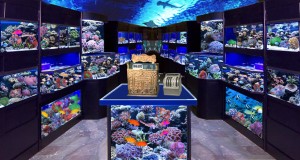 I have said time and time again, that these retailers will destroy our hobby. One road to destruction is simply through pricing. When rocks with three zoanthids sell for over $ 500, only one person wins and that’s the person holding the money. When colorful chalice frags sell for well over $ 1,000.00, it seems crazy. Yet while browsing forums I see this type of thing all the time. A signature name is applied to a coral, suddenly it’s hyped up as the next best thing and before you know it Facebook is lighting up with coral outlets selling it for insane prices.
I have said time and time again, that these retailers will destroy our hobby. One road to destruction is simply through pricing. When rocks with three zoanthids sell for over $ 500, only one person wins and that’s the person holding the money. When colorful chalice frags sell for well over $ 1,000.00, it seems crazy. Yet while browsing forums I see this type of thing all the time. A signature name is applied to a coral, suddenly it’s hyped up as the next best thing and before you know it Facebook is lighting up with coral outlets selling it for insane prices.
As long as people are doing business with these types of outlets, they will remain. There are many (Unique Corals, Pacific East Aquaculture, Live Aquaria, etc) outlets that offer incredible livestock at very fair prices. In addition to the livestock they sell, these outlets offer expert advice on keeping marine animals. While a Facebook page, or forum post may imply that something is super rare or extraordinary, it doesn’t mean that it is. Corals that would once be traded amongst aquarists to keep diversity through the hobby are suddenly being sold for more than high end lighting systems. It’s entirely unaffordable for many, and totally unsustainable as a whole.
Stage 4: Share the love:
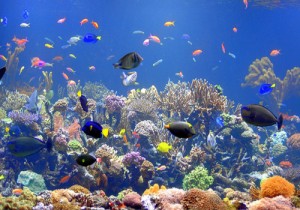 If you’re a good aquarist, share your knowledge and anything else that might help someone out. Recently a young man in my hometown contacted me, having purchased a used 300 gallon tank. There was a crack in the glass, and while he wanted to start a reef aquarium, he didn’t know how to proceed. I aided him in fixing the crack, and assisted in setting up the tank. When he learned that most of the equipment he had purchased with the tank didn’t work, I gladly gave him some equipment I wasn’t using. When his tank is ready to stock, I told him to stop by and I would hook him up with some frags.
If you’re a good aquarist, share your knowledge and anything else that might help someone out. Recently a young man in my hometown contacted me, having purchased a used 300 gallon tank. There was a crack in the glass, and while he wanted to start a reef aquarium, he didn’t know how to proceed. I aided him in fixing the crack, and assisted in setting up the tank. When he learned that most of the equipment he had purchased with the tank didn’t work, I gladly gave him some equipment I wasn’t using. When his tank is ready to stock, I told him to stop by and I would hook him up with some frags.
This is how you create a new generation of reef keepers. Lay a good foundation of advice, help out with some equipment and ease them onto the path of being a contentious, sustainable aquarist. Trying to rip someone off by selling them a chalice frag for $ 800 isn’t contributing to the future of the hobby and greatly underscores the important role marine life vendors play.
Stage 5: Know when to say no:
When I started keeping marine aquariums, I developed a rule of thumb I still apply today, the rule of two. If I try, and fail, at keeping any species of aquatic animal twice, I never try to re-attempt it again. This may sound like a serious limitation, but honestly it pushes me to be a more effective aquarist. If we constantly fail at trying to keep an organism alive, then without question we have to wonder if we simply lack the necessary skill set to do so. Knowing that I only get two chances of success makes me do copious research and make a serious commitment before I buy any animal. It requires that I plan ordering, shipping, acclimation and quarantine out to a tee.
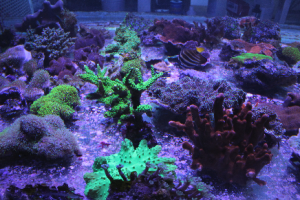 Imagine if every livestock outlet announced that you could only buy a species of marine animal twice. What would change within the hobby, if aquarists knew that constant failure would lead to not being able to purchase any marine animals? As ocean conservation takes the forefront of government agencies, this type of regulation may not be all that improbable.
Imagine if every livestock outlet announced that you could only buy a species of marine animal twice. What would change within the hobby, if aquarists knew that constant failure would lead to not being able to purchase any marine animals? As ocean conservation takes the forefront of government agencies, this type of regulation may not be all that improbable.
Final thoughts:
It’s incredible to see how much the hobby has changed. From trading a few coral frags with friends, to watching people spend a month’s salary on a handful of frags. Moving through the “new century” of reef keeping, perhaps looking to the past for guidance isn’t a bad idea. The hobby has become highly commercialized, with certain coral species becoming a product within a product. Part of it is the natural evolution of any hobby, or industry – but it may underscore the very nature of reef keeping itself. To take part in the wonder and majesty of Mother Nature, to create an ecosystem and in turn learn so much about how the natural world works. The hobbies foot print both on wallets and the environment has grown substantially, and as ocean literacy enters the hearts and minds of the people and legislators, perhaps our approach to keeping captive reefs needs a fresh look.









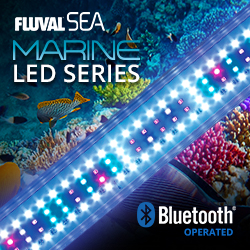
0 Comments